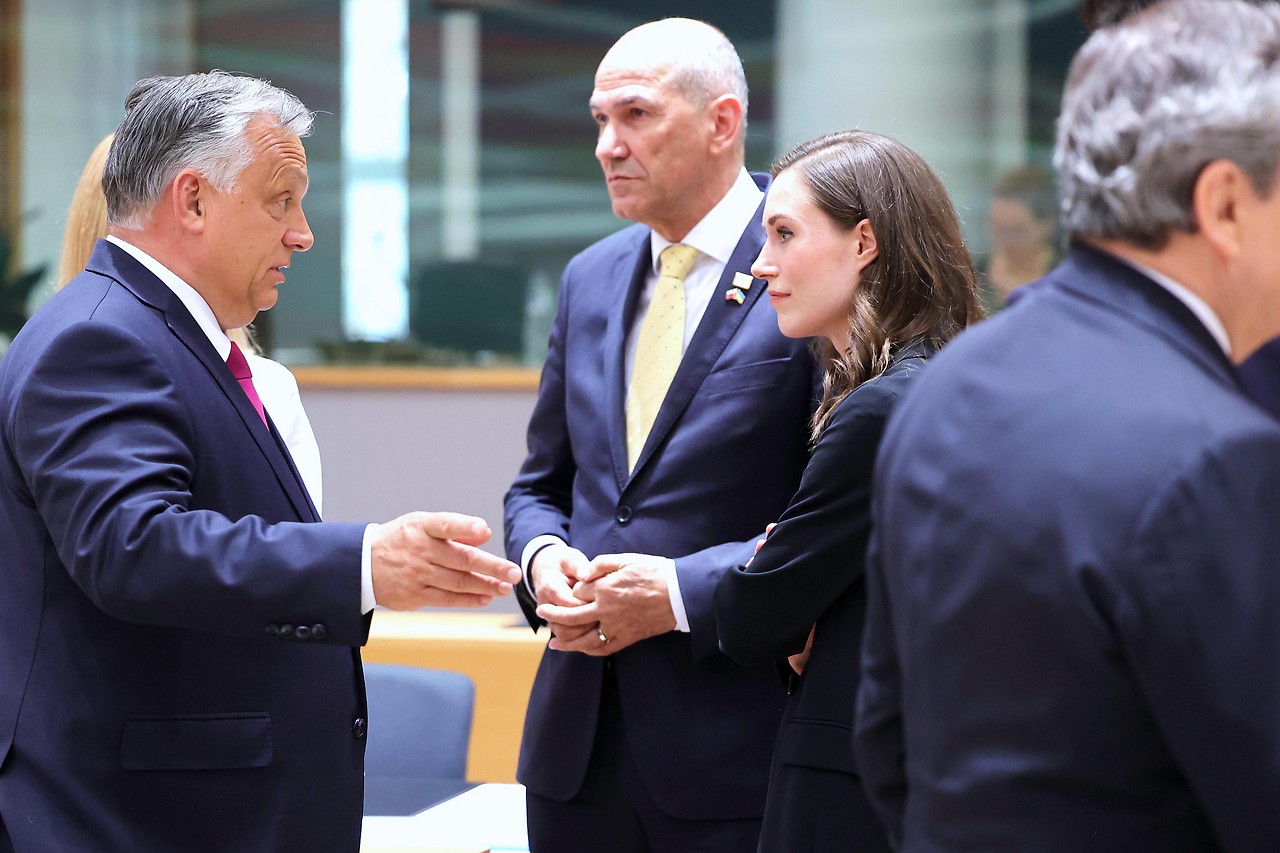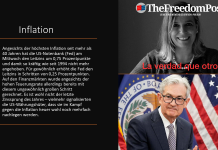
ORBAN MACHT ES VOR
Noch Anfang der Woche hat die EU einen Durchbruch bei den Sanktionen gegen Russland vermeldet und die Einheit in der Union beschworen. Nur wenige Tage später sorgte Ungarn jetzt für neue Aufregung und drohte einmal mehr mit einem Veto für das eigentlich bereits gefeierte sechste EU-Sanktionspaket: Letztlich gab es neue Zugeständnisse. Premier Viktor Orban steht dadurch zunehmend isoliert da. Weitere Vetos könnten künftige EU-Sanktionen komplett ausbremsen.
Erst war Ungarn mit dem Ölembargo nicht einverstanden, diesmal waren es die Sanktionen gegen das Oberhaupt der russisch-orthodoxen Kirche, Patriarch Kyrill, die Budapest offenbar von einer Zustimmung zum sechsten Sanktionspaket abhielten. Untertags gab es Meldungen in alle Richtungen, einmal, dass Ungarn zustimmt, einmal, dass sich Ungarn querlegt. Schließlich gaben die restlichen EU-Länder nach – der Patriarch wurde aus dem Sanktionspaket genommen. Damit fehlt nur noch die letzte Unterschrift der EU-Botschafter – diese soll am Freitag folgen, einen Monat nach Ankündigung des Paketes.
Nach dem Sondergipfel der EU-Staats- und -Regierungschefs am Beginn der Woche sah es so aus, als hätte die Union ihr Gesicht noch einmal wahren können. Doch angesichts eines „verwässerten“ Paketes, wie es EU-Expertin Sophie Pornschlegel vom European Policy Centre (EPC) bezeichnete, einer verlängerten Wartezeit auf eine Einigung und einem weiteren Zugeständnis an Budapest wirkt es so, als wäre das sechste Sanktionspaket in Bezug auf die Strafmaßnahmen der EU womöglich schon das Ende der Fahnenstange.
Ukraine hofft auf weiteres Paket
Dabei drängt die Ukraine schon auf neue Sanktionen: Präsident Wolodymyr Selenskyj sagte nach der – vermeintlichen – Einigung der EU-Staaten am Wochenbeginn: „Letzten Endes sollte es gar keine nennenswerten wirtschaftlichen Verbindungen mehr zwischen der freien Welt und dem Terrorstaat geben.“ Ein siebentes Paket soll nach dem Wunsch der Ukraine her, sobald das sechste umgesetzt sei.

Abfuhr für Gasembargo könnte Sanktionen ausbremsen
Im Raum steht natürlich die weitere Loslösung von russischer Energie – das bedeutet wohl unumgänglich: Gasembargo. Noch während des Gipfels hieß es von Bundeskanzler Karl Nehammer (ÖVP), dass ein solches jedoch „kein Thema“ sei. Auch Deutschlands Kanzler Olaf Scholz (SPD) winkte schon im Voraus ab. War schon die Einigung auf das sechste Paket mehr als mühsam, dürfte ein Veto aus Berlin die Hoffnung auf das Zustandekommen eines siebenten Paketes drastisch minimieren.
„Ich denke, dass es sehr unwahrscheinlich ist, dass es ein umfassendes siebentes Sanktionspaket geben wird“, sagte auch Pornschlegel auf neuerliche Anfrage von ORF.at. Für sie sei es „wahrscheinlicher“, dass es „noch Ergänzungen gibt“, also etwa eine Erweiterung der Liste mit Einreiseverboten für Personen aus Russland und zu bestimmten Industriesektoren.
Expertin: Sanktionen stoppen Krieg nicht
Gleichzeitig stellte sie infrage, wie wirksam neue Maßnahmen überhaupt wären. „Sanktionen haben in der Geschichte selten dazu geführt, dass ein Krieg gestoppt wurde“, so Pornschlegel. Ziel sei es, Russland wirtschaftlich zu schaden – „und solange es kein Gasembargo ist, ist das nur begrenzt der Fall“. Das weitere Vorgehen der EU würde stark vom Kriegsverlauf abhängen – „sowie vom politischen Willen der 27 Mitgliedsländer“. Deutschlands Zögern könnte jedenfalls ein schnelles Vorankommen verhindern.
Analysen aus Brüssel und Budapest
Vom anfänglichen – überraschend – schnellen Handeln der EU ist mit den aktuellen Bemühungen um neue Sanktionen nicht mehr viel übrig. Pornschlegel befürchtet, dass eine weitere „Normalisierung“ der Situation dazu führen könnte, dass die Entscheidungsträgerinnen und -träger in sicherheits- und verteidigungspolitischen Fragen „weniger den Bedarf sehen, die EU ambitioniert voranzubringen“.
Einstimmigkeit als Hemmschuh
„Das Risiko des Status quo der langsamen Entscheidungsfindung ist größer als jenes der Fragmentierung. Abwarten, bis alle Länder an einem Strang ziehen (…) ist nicht die richtige Strategie, wenn ein Krieg an unseren Grenzen geführt wird“, heißt es in einem Papier des Thinktanks EPC. Die Forderung nach der Abschaffung des Einstimmigkeitsprinzips unter den Mitgliedsländern wurde schon im Anschluss an den Sondergipfel laut. Die neuerliche Aufregung aufgrund der Bedenken Ungarns könnte diese Debatte weiter anfachen.
Doch während das wohl ein langfristiges Unterfangen werden könnte, gibt es aktuell bereits Druck auf Ungarn: Denn anders als in der Vergangenheit steht Orban diesmal recht alleine da. Polen, das EU-Pläne oft skeptisch sah und deren umstrittene Justizreform gar zu einem handfesten Streit mit der Kommission führte, befindet sich durch den Krieg in einer komplett anderen Situation.
Denn seit Kriegsbeginn sind bereits mehr als 3,5 Millionen Flüchtlinge aus der Ukraine in Polen angekommen. Die polnische Hilfsbereitschaft wurde immer durch EU-Kommissionspräsidentin Ursula von der Leyen positiv hervorgehoben – und bei Sanktionen legte man sich nicht quer. Am Mittwoch kam die EU nun Warschau entgegen und kündigte grünes Licht für die monatelang blockierten CoV-Hilfsgelder in Milliardenhöhe an.
Ungarn alleine auf weiter Flur
Auch das könnte ein Zeichen in Richtung Ungarn gewesen sein. Nicht zuletzt gingen die anderen Visegrad-Staaten in den vergangenen Wochen ebenfalls eher auf Distanz zu Ungarn. Umso mehr, als Orban letzte Woche handstreichartig sein seit Jahren andauerndes Regieren per Notverordnung erneut verlängerte: Nach Flüchtlingen und Pandemie ist nun der Ukraine-Krieg der Vorwand dafür, demokratische Regeln weitgehend auszuhebeln und den Umbau zu einer illiberalen „Demokratie“ weiter voranzutreiben.
Europaabgeordneter Zdechovsky: Beziehung mit Ungarn nicht mehr so gut
Angesichts des Streits um das Sanktionspaket war dieser neuerliche Affront für Europa und Verstoß gegen europäische Grundprinzipien beinahe untergegangen. Brüssel scheint derzeit auf dem kürzeren Ast zu sitzen. Die Frage ist, ob Orban dem steigenden Druck standhält, wie er sich zu neuen Sanktionen – oder zumindest der Aufhebung von erwirkten Ausnahmen – verhält und ob die EU gar weitere Kompromisse in Erwägung zieht.
Denn es wird ihr wohl ein großes Anliegen sein, weitere Sanktionen auf den Weg zu bringen – auch wenn ein neues Paket zu diesem Zeitpunkt in weiter Ferne scheint. Der wichtigste Hebel ist dabei der gleiche wie immer: Geld. Denn ohne die Milliardenhilfen Brüssels, so zeigen sich Kritiker der EU-Zurückhaltung gegenüber Budapest seit Langem überzeugt, würde Orban wohl innenpolitisch längst ein rauerer Wind entgegenwehen.
Links:
Concessions put the brakes on EU sanctions
ORBAN LEADS THE WAY
At the beginning of the week, the EU announced a breakthrough in sanctions against Russia and invoked unity in the Union. Just a few days later, Hungary caused a new stir and once again threatened to veto the sixth EU sanctions package, which had actually already been celebrated: in the end, new concessions were made. Prime Minister Viktor Orban is increasingly isolated as a result. Further vetoes could completely thwart future EU sanctions.

First Hungary disagreed with the oil embargo, this time it was the sanctions against the head of the Russian Orthodox Church, Patriarch Cyril, which apparently kept Budapest from agreeing to the sixth sanctions package. During the day, there were reports in all directions, once that Hungary agreed, once that Hungary objected. Finally, the rest of the EU countries gave in – the patriarch was taken out of the sanctions package. This leaves only the final signature of the EU ambassadors – this is to follow on Friday, a month after the package was announced.
After the special summit of EU leaders earlier in the week, it looked as if the Union might have saved face once again. But with what EU expert Sophie Pornschlegel of the European Policy Centre (EPC) called a «watered-down» package, an extended wait for an agreement, and another concession to Budapest, it looks like the sixth sanctions package may already be the end of the line in terms of EU punitive measures.
Ukraine hopes for another package
Yet Ukraine is already pushing for new sanctions: President Volodymyr Selenskyj said after the – supposed – agreement of the EU states at the beginning of the week: «At the end of the day, there should be no more significant economic ties at all between the free world and the terrorist state.» Ukraine wants a seventh package as soon as the sixth is implemented.
Hungary’s Viktor Orban with Finnish Prime Minister Sanna Marin.
AP/Olivier Matthys
Orban (left), pictured here talking with Finland’s Prime Minister Sanna Marin, is testing the EU’s patience
Rejection for gas embargo could put brakes on sanctions
Of course, the issue at hand is the further detachment from Russian energy – which probably means an unavoidable gas embargo. Even during the summit, Chancellor Karl Nehammer (ÖVP) said that such an embargo was «not an issue». Germany’s Chancellor Olaf Scholz (SPD) also waved it off in advance. If agreement on the sixth package was already more than laborious, a veto from Berlin is likely to drastically minimize hopes of a seventh package coming to fruition.
«I think it is very unlikely that there will be a comprehensive seventh sanctions package,» Pornschlegel also said in response to a new question from ORF.at. For her, it is «more likely» that there will be «additions,» such as an expansion of the list of entry bans for people from Russia and to certain industrial sectors.
Expert: Sanctions will not stop war
At the same time, she questioned how effective new measures would be in the first place. «Sanctions have rarely led to stopping a war in history,» Pornschlegel said. The goal, she said, is to hurt Russia economically – «and as long as it’s not a gas embargo, that’s only limited.» The EU’s further course of action would depend heavily on the course of the war – «as well as on the political will of the 27 member states.» Germany’s hesitation, in any case, could prevent rapid progress.
Not much is left of the EU’s initial – surprisingly – quick action with current efforts to impose new sanctions. Pornschlegel fears that further «normalization» of the situation could lead decision-makers on security and defense policy issues to «see less need to move the EU forward in an ambitious way.»
Unanimity as a stumbling block
«The risk of the status quo of slow decision-making is greater than that of fragmentation. Waiting for all countries to pull together (…) is not the right strategy when a war is being waged on our borders,» reads a paper by think tank EPC. The call for the abolition of the unanimity principle among member countries was already made in the aftermath of the special summit. The renewed furor over Hungary’s concerns could further fuel that debate.
But while this could be a long-term undertaking, there is already pressure on Hungary: Unlike in the past, Orban is on his own this time. Poland, which often viewed EU plans skeptically and whose controversial judicial reform even led to a tangible dispute with the Commission, finds itself in a completely different situation as a result of the war.
This is because more than 3.5 million refugees from Ukraine have already arrived in Poland since the war began. The Polish readiness to help was always positively emphasized by EU Commission President Ursula von der Leyen – and they did not oppose sanctions. On Wednesday, the EU now accommodated Warsaw and announced the green light for the CoV aid money in the billions, which had been blocked for months.
Hungary on its own
This could also have been a signal in Hungary’s direction. Last but not least, the other Visegrad countries also tended to distance themselves from Hungary in recent weeks. All the more so when Orban, in a coup d’état, last week once again extended his rule, which had lasted for years, by emergency decree: After refugees and a pandemic, the Ukraine war is now the pretext for largely undermining democratic rules and further advancing the transformation into an illiberal «democracy.»
In view of the dispute over the sanctions package, this new affront to Europe and violation of basic European principles was almost lost. Brussels seems to be on the short end of the stick at the moment. The question is whether Orban will be able to withstand the mounting pressure, what his stance will be on new sanctions – or at least the lifting of obtained exemptions – and whether the EU will even consider further compromises.
After all, it will probably be a major concern for it to get further sanctions underway – even if a new package seems a long way off at this point. The most important lever is the same as always: money. Without the billions of euros in aid from Brussels, critics of the EU’s restraint toward Budapest have long been convinced, Orban would long since be facing a rougher domestic political climate.
Links:
EPC
European Council





